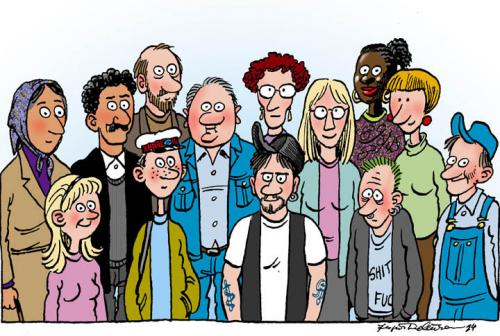By: Maria Brown
I think that adopting a state level policy prohibiting
classifying people by race, color, ethnicity, or national origin would be very
beneficial. What is the real purpose of
classifying people? Why can’t we all
just be human? Classifying people is really
segregation. It’s another degree of separation
and it clearly draws lines between certain groups of people. There are too many opportunities to favor or
hinder a specific group. We are living
in a time when discrimination is still rampant and certain groups of people
still benefit from being classified as one race over another.
Don’t get me wrong. I
understand that people already have a natural predisposition to stereotype
others based on race/color of skin and classifying people or not classifying
people won’t immediately change that. However
not classifying people can help control the harmful information and statistics
that are put out in the mass media. That
same harmful information is what aids in the stereotypes that people have. For example, saying that the prison system is
filled with 85% black people fuels the public’s opinion that black people
should be feared. In turn, it hinders
that same group of people from many opportunities.
On the opposite side of the spectrum, affirmative action can
be interpreted as reverse discrimination and it still favors one race or group
of people over another. Not only is this not “fair” but it often strengthens the
natural division between races.
In addition, how can some people truly choose just one race? For example, I have a white father and a black mother. I am truly 50/50. However there is never a check box on the race designation forms for me. I'm always forced to choose one over the other when really I'm both.
By
designating everyone simply as human, we can begin the process of knocking down
the walls of stereotypes, preventing discrimination and moving America truly
towards the great “melting pot” that we claim to be.
Edited by Barbara Latimer

Data, by itself is not harmful. How data is used can be problematic, but we cannot as a society forego its relevance because some humans can be narrow minded and bigoted. Humans must be dealt with through other avenues of consequence
Edited by Barbara Latimer
……………….Human
With Government Needs
By Barbara Latimer

When anyone is first asked about the state policy of classifying
people, the neck hairs start to tingle. All sorts of negative connotations come
to mind and our instinct is to find the idea repugnant, but classifications of
people by race, color, ethnicity, or natural origin actually serve a purpose in
our lives. The collection and analysis of this data provide the means for documenting
the demographic changes within our state and the resulting need for funding of critical
social programs in our society. States
should have the right to classify groups of people as the benefits derived from
this effort far outweigh any individual objections due to perceived racial extrapolations
or labels.
Without the ‘personal’ data states and the U.S. Census Bureau
collect, it would be impossible to keep abreast of statistically relevant demographic
changes in a community, or anticipate constituent needs. If a community doesn’t
know for example how many women reside within its borders, how can it
anticipate the extent of domestic violence related services it may be called
upon to provide, or the volume of childcare related requests for assistance it may
theoretically receive? If a community doesn’t know how many immigrants have relocated
there, how can it adequately gauge the impact to the ESL programs or standardized
test results? I think you get the point. Government efforts, whether at the local,
state, or national level to collect information do so in the furtherance of the
common good.
Need more convincing……..let’s look at the latest data excerpt
below from the U.S. Census for Morrow,
Georgia. Consider why the data might be personally useful to know. If you are
the city of Morrow, the more accurate the reporting of your comprehensive data,
the more likely federal dollars will be allocated for funding schools, medical
indigent care, road construction, law enforcement, and cultural awareness
programs.
Percent of community Black: 45.5%
Percent of community White: 22.1%
Percent of community Asian: 25.5%
Percent of persons reporting two or more races: 2.6%
Percent where language other than English spoken at home,
age 5+: 37.4%
Data, by itself is not harmful. How data is used can be problematic, but we cannot as a society forego its relevance because some humans can be narrow minded and bigoted. Humans must be dealt with through other avenues of consequence


